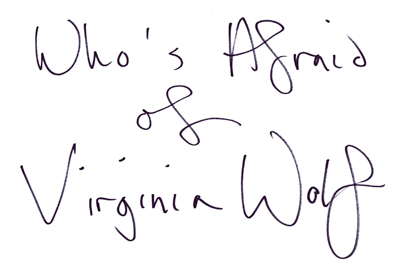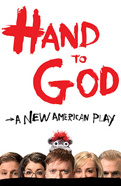Hand to God Playwright Robert Askins on Being a Title Fetishist, Losing the Texas Tragedy & What Opens Doors

Texas-born Robert Askins is making his Broadway debut with Obie-winning raunchy puppet comedy Hand to God, which previously played off-Broadway’s MCC Theater and had three sold-out runs at Ensemble Studio Theater. His other works include the one-act Matthew and the Pastor's Wife, which was a part of Marathon 2010 at EST, and The Love Song of the Albanian Sous Chef, which won a Dallas Outer Circle Critics Award in 2011. His next play, Permission, will premiere at MCC Theater. Broadway.com sat down with Askins at Brooklyn’s Café Pedlar to talk about caffeine as motivation, how he got noticed in college and the one thing every writer must do.
What’s the first thing you do when you sit down to write?
I go through a series of websites to visit, so I can procrastinate one last time. I’ll do email, Facebook, Twitter and then I’ll finally get down to writing. The deal that I make with myself is that I don’t drink coffee or tea in my house and I’m an addict, so I need to get to the coffee shop to write.
What time of day do you get your best work done?
Always in the morning. I’ve been writing in the morning for so long that I’m not sure if that’s just how my body as a machine is built to make words.
What playwrights do you look up to?

How do you stay motivated to finish a piece?
Getting to the end is something that I want. It’s really about pushing through the fear. I do a lot of meetings in Hollywood now, and a lot of people say they know story and character, and that’s fine. But the thing that differentiates a writer from somebody else is the fact that a writer makes pages. You have one job—a very simple job—you put marks on an empty space. It’s the whole job. You have to make the pages.
What inspired Hand to God?
It was a combination of a lot things: my mother did have a Christian puppet ministry when I was growing up, I was very involved in the church when I was younger, my father passed when I was 16. Those things are the bedrock foundation seminal moments in my childhood. For a long time, I was writing about them in a Sam Shepard way—trying to understand them as Western surreal tragedy. It took me a long time to figure out that it wasn’t tragedy; it was comedy.
Was there a specific event that made you start writing the play?
I saw Steve [Boyer] and Geneva [Carr] standing together at a party. All of those themes gelled very quickly into those specific bodies. I’d had a couple of glasses of wine, and I was like, “Oh! That’s the play!” The play is Steve and Geneva as mother and son and Geneva is f*cking his friend. I went home and wrote Tyrone’s prologue, and that’s how the play started.
Where did the title come from?
Hand to God is an expression about honesty. It’s a southern regionalism that’s fairly unknown in the North. It just seemed to make sense. I’m a big title fetishist: bad title = bad play. Also, you can’t overthink a title. The play should be a thought—it should be one motion and one expression. If the title does not seem obvious and apparent, you probably shouldn’t start writing it.
What play changed your life?

When did you know you wanted to be a playwright?
When I was in college at Baylor University, which is a Baptist University in Waco, Texas. I went to school for performance first, but I didn’t get any stage time. I was a troubled and trouble-making kid. I wrote this very aggressive, very violent 10-minute play about Jesus and the devil in prison for a 10-minute play contest. It was this complex theological allegory that had some nonconsensual sodomy in it. I could be ignored and marginalized until I put things on paper. I submitted it to the festival, and I think I tied for second, but it didn’t matter. My rage was now an object. It didn’t matter what the f*ck you thought of Rob Askins anymore, now you could talk about Rob Askins’ play, and you could take that seriously. I couldn’t take the stage in one way, but I figured out a better way to do it.

What’s the best piece of advice you’ve ever received about writing?
I work the 52nd Street Project sometimes—they do plays with kids in Hell’s Kitchen. Lewis Black was there helping the kids, and he said, “If you think it’s funny, it’s funny.” That’s everything.
Do you keep a notebook?
No, I don’t like any of that crap. All of my plays are in continuous dialogue with each other. None of them exist in isolation. Not literally—I mean I’m not writing one 12-part masterwork. I never stop thinking about the central preoccupations that you can see in my work. That’s what I’m always thinking about, so there’s no reason to f*cking write that shit down. It’s the running dialogue in my head all the f*cking time.
What do you want to say to aspiring writers?
Stop trying to get into grad school! Stop trying to win major prizes. F*ck that shit. Seriously. It’s destroying you. Don’t worry about the parties. Don’t worry about getting into the right circles. Theater is one of the most elitist, exclusive and alienating art forms in America right now. Get your friends together. Write until it’s good. That’s all you have to do. Repeat, repeat, repeat, repeat. If you feel like you’re on the outside and nobody’s listening to you? Write the play.There’s a deep perversity in theater people: we love a good play. A lot of things will be forgiven and forgotten if you make a good play—suddenly doors will swing open wildly.
What has surprised you the most about having a play on Broadway?
I think it’s the stage door stuff. It’s just cool to see strangers there for Steve [Boyer]—or anyone in the cast. Every once in a while I go out the stage door and someone knows who I am and asks me to sign their Playbill. And that’s cool and weird—and not really why I got into this. But it’s like, “Thanks, man. I’ll sign that thing. I worked hard on this for a long time, and I’m glad you dug it.”
What's your favorite line in Hand to God?

